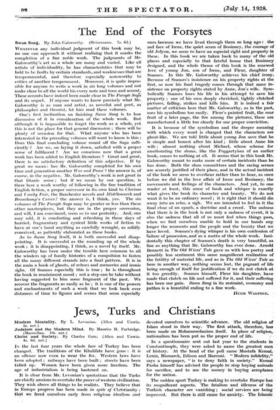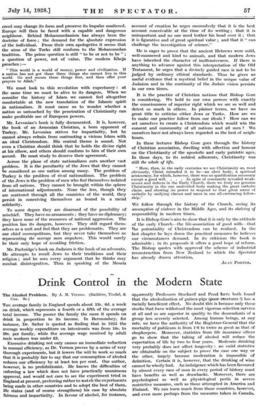Jews, Turks and Christians
Judaism and the Modern Mind. By Maurice H. Farbridge. (Macmillan. 10s. net.) IN the last four years the whole face of Turkey has been changed. The traditions of the Khalifate have gone : it is an offence now even to wear the fez.. Western laws have been adopted ; railways have been built ; streets have been tidied -up. Women have been given more freedom. The age of industrialism is being hastened on.
It is clear from Mr. Levonian's quotations that the Turks are chiefly anxious to overtake the power of western civilization. They wish above all things to be realists. They believe that in Europe progress has been made in spite of Christianity ; that we freed ourselves early from -religious idealism -and- devoted ourselves to scientific advance. The old religion of Islam stood in their way. The first attack, therefore, has been made on Mohammedanism itself. In place of religion,. nationalism has been put as the proper end of life.
In a questionnaire sent out last year to the students in Constantinople, they were asked to name the greatest men - of history. At the head of the poll came Mustafa Kemal, Lenin, Bismarck, Edison and Marconi. " Modern infidelity," says a newspaper, " is to deny 'faith in society." Kemal Pasha himself has advised the people- to stop buying animals for sacrifice, and to use the money in - buying aeroplanes for the nation.
The sudden spurt Turkey is making to overtake Europe has its magnificent aspects. The fatalism -and idleness of the Turkish character are vanishing ; social services are being improved. Mit there is still cause for. anxiety. The Islamic
creed may change its form and preserve its impulse unaltered. Europe will then be faced with a capable and dangerous neighbour. Behind Mohammedanism has always been the doctrine of force ; the demand for the absolute expression of the individual. From their own apologetics it seems that the aims of the Turks still conform to the Mohammedan tradition. The prime question is still " to be or not to be " ; a question of power, not of value. The modern Khoja preaches :-
"This world is a world of money, power and civilization. If a nation has not got these three things she cannot live in this world. Go and secure these things first, and then offer your prayers to Allah."
We must look to this revolution with expectancy : at the same time we must be alive to its dangers. When we consider the history of Islam we cannot feel altogether comfortable at the new translation of the Islamic spirit in nationalism. It must cause us to wonder whether a nation so untouched by the penetration of Christianity can make profitable use of European powers.
Mr. Levonian's book is fully documented. It is, however, the book of an Armenian Christian, a born opponent of Turkey. Mr. Levonian strives for impartiality, but he cannot always refrain from contrasting a vicious Islam with an ideal Christendom. His central theme is sound. Not even a Christian should think that he holds the divine right at his elbow, and others should conform to him of their own accord. He must study to deserve their agreement.
Across the plane of state nationalisms cuts another vast problem. It is the peculiarity of the Jews that they cannot be considered as one nation among many. The problem of Turkey is the problem of rival nationalisms. The problem of the Jews is the problem of men who feel themselves isolated from all nations. They cannot be brought within the sphere of international adjustments. None the less, though they are scattered through all the countries of the world, they persist in conceiving themselves as bound in a racial solidarity.
To some degree they are disarmed of the possibility of mischief. They have no armaments ; they have no diplomacy; they have none of the resources of national aggression. The position has its dangers, however. They still regard them- selves as a unit and feel that they are problematic. They are our chief cosmopolitans, but they never take themselves as representing the average man anywhere. This would surely be their only hope of avoiding friction.
Mr. Farbridge's book on Judaism is the book of an advocate. He attempts to recall Jews to their traditions and their religion ; and he uses every argument that he thinks may combat disintegration. Thus in speaking of the Mosaic account of creation he urges successively that it is the best account conceivable at the time of its writing ; that it is unimportant and no one need bother his head over it ; that it is figurative and of great spiritual value ; and that it " can challenge the investigation of science."
He is eager to prove that the ancient Hebrews were mild, well-mannered and kind to animals, and that modern Jews have inherited the character of inoffensiveness. If there is anything to advance against this interpretation of the Old Testament, he urges that a divinely guided race is not to be judged by ordinary ethical standards. Thus he gives us useful evidence that a mystical belief in the unique value of Judaism and in the continuity of the Judaic vision persists in our own times.
It is the practice of Christian nations that Bishop Gore is considering. We hold to our own powers with exactly the consciousness of superior right which we see so well and detest so much in others. In plainer terms, we have no great title to criticize either Jews or Turks. How are we to make our practice follow from our ideals ? How can we set ourselves to create a Christendom which would win the consent and community of all nations and all men ? We ourselves have not always been regarded as the best of neigh- bours.
In these lectures Bishop Gore goes through the history of Christian association, dwelling with affection and honour on the Christianity of the apostolic and early patristic ages. In those days, to its noblest adherents, Christianity was still the whole of life.
" Here, then, in the early centuries we see Christianity as, most obviously, Christ intended it to be—an elect body, a spiritual aristocracy, for which, however, there was no qualification necessary except a good will.. . . In spite of constantly revealed weak- nesses and defects in the Early Church, there we truly see genuine Christianity in the one undivided body making the great catholic claim, and showing its power to respond to that great name of catholic by unifying classes and races in one all-embracing fellow. ship."
We follow through the history of the Church, seeing its assumption of violence in the Middle Ages, and its shelving of responsibility in modern times.
It is Bishop Gore's aim to show that it is only by the attitude of the early Church—the life-association of good wills—that the potentiality of Christendom can be realized. In the last chapter he lays down the practical measures he believes our circumstances demand. In its criticism the book is admirable ; in its proposals it offers a good hope of reform. The Bishop quotes with approval the scheme of industrial reconstruction from New Zealand to which the Spectator has already drawn attention.
ALAN PORTER.





































 Previous page
Previous page